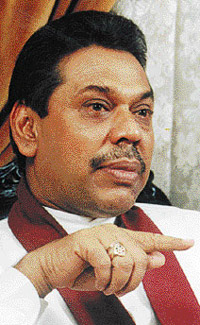Sri Lankan president heads to Pakistan
Sri Lanka's President Mahinda Rajapakse left Friday for a three-day official visit to Pakistan, hoping to cement better trade and defense ties with the South Asian neighbor, officials said. Rajapakse was scheduled to meet with his Pakistani counterpart, President Gen. Pervez Musharraf, Prime Minister Shaukat Aziz and other officials and sign several agreements on tourism, culture, railways and education, officials at the foreign ministry said.

"It is a very important visit, Pakistan had been a trusted friend of Sri Lanka for decades," Lucian Rajakarunanayake, a director the President's Media Office, told The Associated Press. Analysts have said that Rajapakse could be looking to Pakistan to arm his country's ill-equipped military which is facing the threat of a resurgent separatist war with Tamil Tiger rebels.
Sri Lanka 's biggest and closest neighbor, India , does not supply offensive weapons to Sri Lanka due to domestic political constraints. India is home to 56 million ethnic Tamils. This often forces Sri Lanka to turn to Pakistan . Rajakarunanayake declined to say if military cooperation would be on the agenda between the two leaders, but noted that, " Pakistan has helped Sri Lanka at a crucial moment with regard to the war of separation. Sri Lanka would look forward to a continued assistance in the same manner."
Pakistan was among the countries that provided emergency military assistance to Sri Lanka when the rebels came close to capturing Jaffna , in the Tamil-heartland in 2000. They were eventually beaten back by the Sri Lankan military, re-armed with Pakistani weapons. Pakistani diplomats based in Colombo said Islamabad was open to discussing a weapons deal.
Rajapakse's departure came as a respected Sri Lankan newspaper published an interview with Musharraf in which the Pakistani president said he is against separatism in Sri Lanka .
"We are against separatism in Sri Lanka . We believe and respect the territorial integrity and sovereignty of Sri Lanka ," Musharraf told Bandula Jayasekara, editor of the Daily News newspaper, in an interview in Islamabad . The LTTE, or Tamil Tigers, began fighting in 1983 for a separate state for minority Tamils in Sri Lanka's northeast, claiming discrimination by the country's Sinhalese majority. The conflict caused an estimated 65,000 lives until a cease-fire in 2002.
But the truce has come under severe strain due to spiraling violence, with more than 166 people, including 87 government security personnel, killed since December. Both sides agreed in Geneva , Switzerland last month to scale down the violence and meet again for talks in April, reports the AP.
N.U.
Subscribe to Pravda.Ru Telegram channel, Facebook, RSS!





